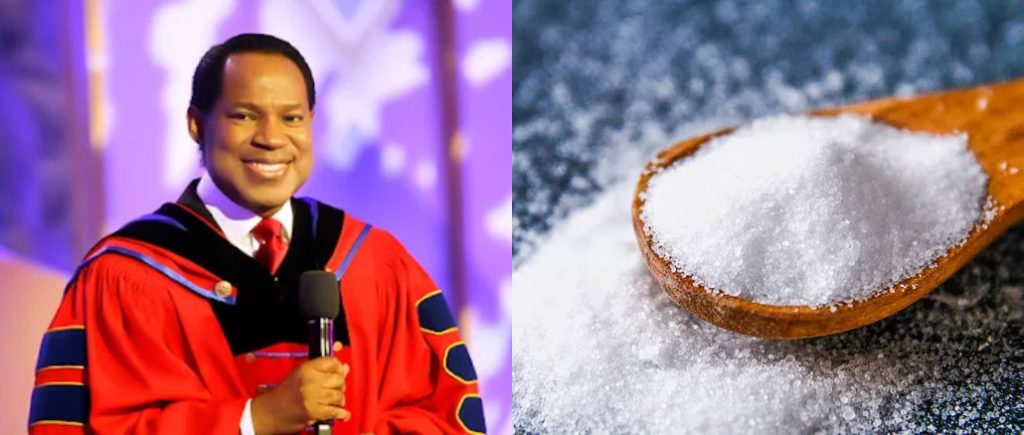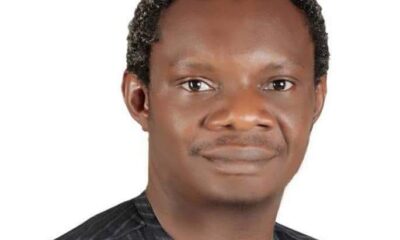EDITORIAL
Pastor Chris Oyakhilome’s Salt Consumption Statement: Health Advice or Misleading Information?

In a recent public statement, Pastor Chris Oyakhilome, the founder of Loveworld Incorporated (also known as Christ Embassy), stirred controversy when he suggested that reducing salt intake could lead to harmful health consequences, including strokes.
His comments quickly went viral, leading many to question whether his spiritual views on health are aligned with the well-established medical guidelines that recommend limiting salt consumption. The pastor’s remarks have triggered significant debate, especially with a large portion of his followers and the general public who look to him for guidance on both spiritual and practical matters.
The heart of the controversy lies in the way Pastor Oyakhilome’s statements appear to contradict global health recommendations. For decades, research has shown that excessive salt intake contributes significantly to the development of high blood pressure, heart disease, and stroke—conditions that are among the leading causes of death worldwide. The World Health Organization (WHO) and the American Heart Association (AHA) both recommend limiting daily salt intake to less than five grams, approximately one teaspoon, as part of a broader effort to reduce the risk of cardiovascular diseases. These recommendations are based on extensive research and clinical studies conducted over many years, which have found a direct link between high sodium levels and poor heart health.
Pastor Oyakhilome, however, made a strong case for the idea that salt is vital for the body, emphasizing its essential role in maintaining bodily functions. According to his statement, cutting back on salt could lead to severe health consequences like strokes. While it is true that the body requires some sodium for proper nerve function and fluid balance, most people consume much more salt than they need, which can lead to long-term health risks. The pastor’s comments, if not carefully examined, could lead to confusion, especially for those who trust his words without questioning the medical implications.
The Federal Ministry of Health and Social Welfare in Nigeria was quick to respond to Oyakhilome’s claims. In a statement, the Ministry cautioned Nigerians against following his advice and reiterated that excessive salt intake is linked to a wide range of health issues, including hypertension and kidney disease. The Ministry’s response emphasized the importance of adhering to scientifically-backed health advice and stressed that while faith plays an important role in the lives of many Nigerians, health decisions should not be based solely on personal beliefs or unverified claims. This public rebuttal highlights the responsibility of influencers, especially those with large followings, to promote accurate, science-based health information.
The issue at hand raises an important ethical question about the role of public figures, particularly religious leaders, when it comes to health matters. As individuals who hold substantial influence over their audiences, pastors like Oyakhilome have an obligation to be mindful of the potential consequences of their statements. Health is a critical aspect of life, and giving out advice that contradicts established medical guidelines could potentially harm vulnerable followers. While spiritual leaders often provide guidance on faith, it is essential that they avoid presenting unverified or scientifically unsupported claims, particularly when it comes to issues as important as public health.
The controversy also highlights a broader concern about the intersection of faith and science. Many religious communities around the world struggle to reconcile spiritual teachings with scientific knowledge, particularly when it comes to issues like health. Some faith-based organizations and leaders manage to integrate faith and science in a balanced way, encouraging people to seek medical treatment while also praying for healing. However, Pastor Oyakhilome’s statements seem to encourage a reliance on faith over established medical advice, which could leave followers vulnerable to harmful health decisions.
While Pastor Oyakhilome’s intentions may not have been malicious, his influence requires a greater level of responsibility. Given the widespread reach of his ministry, the pastor’s statements about salt have the potential to significantly shape public opinion, especially in a country like Nigeria, where his followers look to him for advice on a variety of life matters. It is crucial for religious leaders to recognize the impact their words can have and ensure that their teachings align with the broader health recommendations set forth by experts and institutions that prioritize the well-being of individuals.
While faith and spirituality are crucial components of many people’s lives, health decisions must be rooted in sound, evidence-based knowledge. The Federal Ministry of Health’s swift response to Pastor Oyakhilome’s claims serves as a reminder that health guidance should come from professionals who base their recommendations on scientific research rather than personal interpretations. It is essential for religious leaders to encourage their followers to balance their faith with the knowledge provided by experts, ensuring that they make informed decisions that benefit their long-term health. Ultimately, while spiritual guidance is important, when it comes to health, the best approach is to combine faith with the wisdom and knowledge gained through scientific inquiry.
Discover more from Asiwaju Media
Subscribe to get the latest posts sent to your email.
-

 NEWS5 days ago
NEWS5 days agoPastor Paul Enenche Rejects ₦30 Million Donation From Kebbi Government During Crusade
-

 NEWS6 days ago
NEWS6 days agoTinubu Blasts IGP Egbetokun Over Failure to Arrest Benue Killers
-

 POLITICS1 day ago
POLITICS1 day agoEbonyi Rep Member Threatens Constituent for Supporting Charity Foundation
-

 POLITICS5 days ago
POLITICS5 days agoTight Security In Uyo As Tinubu Set To Attend Governor Umo Eno’s Grand Welcome Into APC
-

 NEWS6 days ago
NEWS6 days agoPresident Tinubu Visits Hospitalized Victims of Benue Massacre
-

 INSIDE NYSC4 days ago
INSIDE NYSC4 days agoALGON Chairman Donates Transformer to NYSC Ebonyi Orientation Camp, Ends Years of Power Outage
-

 JOBS/SCHOLARSHIPS1 day ago
JOBS/SCHOLARSHIPS1 day agoCDCFIB Announces Nationwide Recruitment into Paramilitary Agencies
-

 NEWS5 days ago
NEWS5 days agoCall For Applications: Green Money Project for Nigerian Youth in Agribusiness 2025
-

 NEWS4 days ago
NEWS4 days agoSPECIAL REPORT: Nigeria’s Slow Descent into Anarchy; Warnings Ignored, Blood Still Spills
-

 NEWS4 days ago
NEWS4 days agoArmed Herdsmen Attack Benue Community 48 Hours After Tinubu’s Visit
-

 NEWS6 days ago
NEWS6 days agoEbonyi Commissioner Gifts Toyota Corolla to Personal Assistant for Dedicated Service
-

 SPORTS5 days ago
SPORTS5 days agoVictor Osimhen Recalls Cleaning Gutters For N30 During Childhood Struggles






















